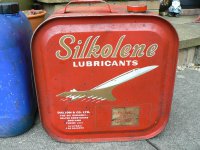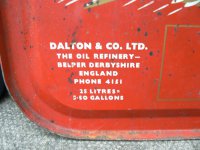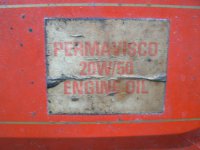With Twinkle (my '16 plate 1.0 petrol direct injection Ibiza) now well out of warranty, and having decided I'm going to service and maintain her myself, my thoughts are turning to what oil I'm going to use. The "easy" choice would be to simply go with the manufacturer recommendation which is a Castrol oil, either a 5w-30 or a 5w-40 to VW spec 502 or 504 - or so Mr Haynes says. I really must check the owner's manual. However the stated capacity is 4 litres and Castrol seem to now sell their products in 4 litre, rather than 5 litre containers so leaving virtually nothing for top ups. (This seems to be a developing trend as I noticed a couple of others also selling in 4 litre containers.) There's also the fact that the Castrol product, which I hold in high regard, is seldom discounted to any great extent. The main dealer, who has been servicing her during her warranty period, tells me that as I elected to go with the fixed/yearly regime she's been running on a "professional" Castrol 5w-40 oil not available to the public which comes in bulk containers? I've not had any success trying to find out any specs for it.
Then there's the fact she's a petrol direct injection design without any port injectors. Direct injection has been around for a while now and has been adopted by most of the manufacturers for emission compliance and economy reasons. The Ibiza consistently returns around 60 mpg on long haul journeys and is also very good on local stuff which is comparable with my old 1.9 tdi - I'm very impressed. However there does seem to be a "Dirty Little Secret" with direct injection engines - Inlet port and valve carbon fouling!
If you're sitting thinking, "what is he on about"? I am not surprised because I've not been able to engage anyone at a main dealer in meaningful conversation on this subject! However here are a couple of You Tube offerings on the subject which might bring you up to speed on the subject:
I've been in conversation, off and on, with a number of specialists and oil manufacturers/suppliers for a while now and there seem to be moves afoot to produce oils for these engines which will minimize this problem. The latest API spec seems to be "SN PLUS" (I'm not sure if ACEA are making specific recommendations yet?) but it, The API spec, seems more concerned with minimizing Low Speed Pre Ignition problems than inlet fouling. (LSPI in Direct Injection engines being another whole "can of worms" if you'd like another avenue to explore)
https://www.castrol.com/en_us/unite...nd-fluids/new-api-sn-plus-specifications.html
At this time I'm veering somewhat towards one of my favourite brands - Fuchs - who seem to be making claims about low volativity. Their supersyn 5w-40 is also vw 502 certified.
The next service is due in March next year so I have plenty of time to haver and procrastinate before I have to settle on a choice. Anyone want to add to my investigations? Schumi? Do I remember correctly that you work with Shell? Are you guys concerned about this? Perhaps you are already well on the road with a specific solution?
Anyway, if nothing else, I hope you all enjoy the vids - I find it a fascinating subject. It just occurred to me that I "fiddle about" with older Fiat stuff - Pandas and the Punto. My experience is pretty much all with the FIRE group of engines, unless you want to go back to the Mirafiore and 128? and I've forgotten most of what I knew about them! Are newer Fiat petrol engines direct injection? I don't really know.
Kindest regards
Jock
Then there's the fact she's a petrol direct injection design without any port injectors. Direct injection has been around for a while now and has been adopted by most of the manufacturers for emission compliance and economy reasons. The Ibiza consistently returns around 60 mpg on long haul journeys and is also very good on local stuff which is comparable with my old 1.9 tdi - I'm very impressed. However there does seem to be a "Dirty Little Secret" with direct injection engines - Inlet port and valve carbon fouling!
If you're sitting thinking, "what is he on about"? I am not surprised because I've not been able to engage anyone at a main dealer in meaningful conversation on this subject! However here are a couple of You Tube offerings on the subject which might bring you up to speed on the subject:
I've been in conversation, off and on, with a number of specialists and oil manufacturers/suppliers for a while now and there seem to be moves afoot to produce oils for these engines which will minimize this problem. The latest API spec seems to be "SN PLUS" (I'm not sure if ACEA are making specific recommendations yet?) but it, The API spec, seems more concerned with minimizing Low Speed Pre Ignition problems than inlet fouling. (LSPI in Direct Injection engines being another whole "can of worms" if you'd like another avenue to explore)
https://www.castrol.com/en_us/unite...nd-fluids/new-api-sn-plus-specifications.html
At this time I'm veering somewhat towards one of my favourite brands - Fuchs - who seem to be making claims about low volativity. Their supersyn 5w-40 is also vw 502 certified.
The next service is due in March next year so I have plenty of time to haver and procrastinate before I have to settle on a choice. Anyone want to add to my investigations? Schumi? Do I remember correctly that you work with Shell? Are you guys concerned about this? Perhaps you are already well on the road with a specific solution?
Anyway, if nothing else, I hope you all enjoy the vids - I find it a fascinating subject. It just occurred to me that I "fiddle about" with older Fiat stuff - Pandas and the Punto. My experience is pretty much all with the FIRE group of engines, unless you want to go back to the Mirafiore and 128? and I've forgotten most of what I knew about them! Are newer Fiat petrol engines direct injection? I don't really know.
Kindest regards
Jock
Last edited:




